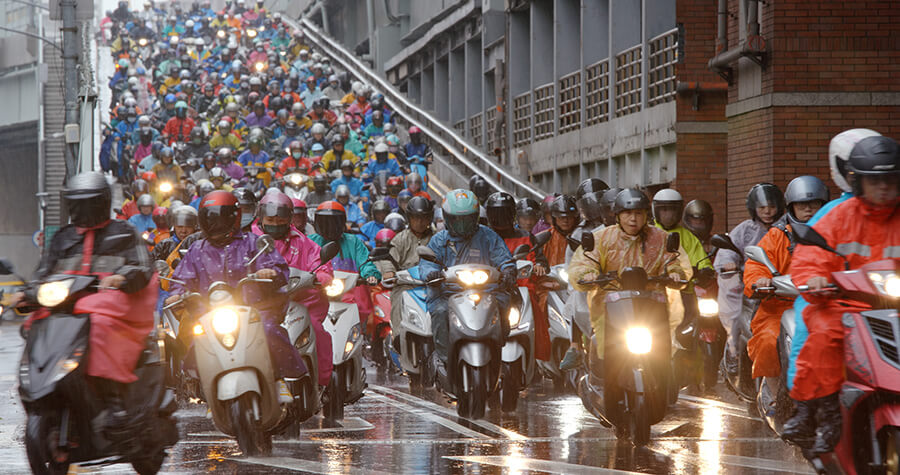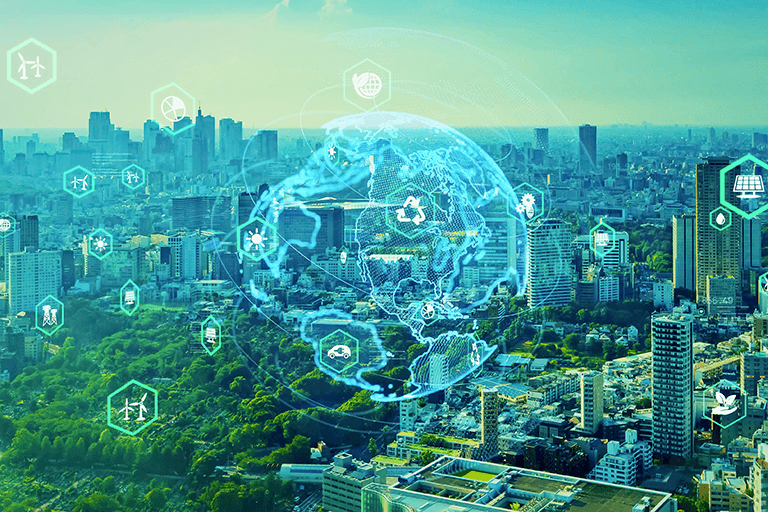Energizing the Future: Electric Vehicles In Taiwan
With the market for electric transportation accelerating globally, Taiwan is also on the road to more sustainable mobility. Check out how last mile and low-emissions deliveries are being powered by e-scooters and EVs.
Like much of the Asian continent, Taiwan’s bustling streets are filled with the rush of scooters driving passengers or dropping off deliveries. According to the Ministry of Transportation, as of January 2024, Taiwan boasted a staggering 14.5 million scooters.
Scooters as a transportation method dominate Taiwan's transport ecosystem. However, this ubiquitous reliance of fuel-powered scooters poses a significant hurdle to Taiwan’s sustainability goals.
The ever-growing number of fuel-powered vehicles such as scooters contributes to air pollution, excessive energy consumption, and a rising carbon footprint. To combat this challenge, governments worldwide have shifted their focus to EVs, implementing policies and fostering the development of related industries to promote widespread adoption of these new modes of transport.
As a low-emission alternative, EVs offer a powerful solution. They can significantly reduce carbon dioxide and improve air quality in cities, paving the way for a more sustainable future. This is especially crucial for Taiwan, with its dense urban environments and heavy reliance on traditional fuels.
According to the Industrial Technology Research Institute, the development of electric vehicles can be traced back to the 1830s, when Thomas Davenport created the first vehicle directly powered by an electric motor. However, progress stalled as limitations in battery technology and consumer and manufacturer preferences catapulted the development of internal combustion engine (ICE) vehicles. Now nearly two centuries later, EVs are playing catch-up to ICE vehicles in terms of R&D and deployment.
Scooters as a transportation method dominate Taiwan's transport ecosystem. However, this ubiquitous reliance of fuel-powered scooters poses a significant hurdle to Taiwan’s sustainability goals.
The challenge to reduce carbon emissions in cities
The ever-growing number of fuel-powered vehicles such as scooters contributes to air pollution, excessive energy consumption, and a rising carbon footprint. To combat this challenge, governments worldwide have shifted their focus to EVs, implementing policies and fostering the development of related industries to promote widespread adoption of these new modes of transport.
As a low-emission alternative, EVs offer a powerful solution. They can significantly reduce carbon dioxide and improve air quality in cities, paving the way for a more sustainable future. This is especially crucial for Taiwan, with its dense urban environments and heavy reliance on traditional fuels.
Tracing the roots of electric vehicles
According to the Industrial Technology Research Institute, the development of electric vehicles can be traced back to the 1830s, when Thomas Davenport created the first vehicle directly powered by an electric motor. However, progress stalled as limitations in battery technology and consumer and manufacturer preferences catapulted the development of internal combustion engine (ICE) vehicles. Now nearly two centuries later, EVs are playing catch-up to ICE vehicles in terms of R&D and deployment.

Fast forward to today, and the narrative is changing. Growing global concerns about climate change and renewed focus on lowering emissions has led to a resurgence of interest in electric vehicles with low carbon emissions. This has spurred rapid advancements in electric vehicle technology, propelling the industry forward.
According to the electric vehicles industry report by DIGITIMES, the global EV sector surged in 2023, reaching a sales volume of 14.22 million units, up 39% from the previous year. The same year, the electric vehicle market in Taiwan also experienced a significant growth, up 60% in one year with record annual sales of 20,000 vehicles.
The rise of electric transportation
According to the electric vehicles industry report by DIGITIMES, the global EV sector surged in 2023, reaching a sales volume of 14.22 million units, up 39% from the previous year. The same year, the electric vehicle market in Taiwan also experienced a significant growth, up 60% in one year with record annual sales of 20,000 vehicles.

However, despite this growth, Taiwan’s electric scooter market is still in its early stages. For a country where much of the population drives scooters, the penetration rate of electric scooters remains low, at around 10%.
Electric scooters offer a variety of compelling advantages. Powered by batteries, they are quiet and environmentally friendly, emitting no exhaust fumes. Their simpler design, without internal combustion engines, fuel and exhaust systems, or ignition devices, translates to simpler construction and lower maintenance costs compared to gasoline scooters.
To accelerate the development of the EV industry in Taiwan, the National Development Council of Taiwan wis proactively supporting and investing in domestic EV technology. This includes subsidies for the local production of electric vehicles, and the research and development of key EV components. These initiatives contribute to the country’s goal of reaching net-zero emissions by 2050.
Clean, quiet, and cost-effective: the advantages of EVs
Electric scooters offer a variety of compelling advantages. Powered by batteries, they are quiet and environmentally friendly, emitting no exhaust fumes. Their simpler design, without internal combustion engines, fuel and exhaust systems, or ignition devices, translates to simpler construction and lower maintenance costs compared to gasoline scooters.
To accelerate the development of the EV industry in Taiwan, the National Development Council of Taiwan wis proactively supporting and investing in domestic EV technology. This includes subsidies for the local production of electric vehicles, and the research and development of key EV components. These initiatives contribute to the country’s goal of reaching net-zero emissions by 2050.

Like many markets in Asia, Taiwan relies heavily on scooters to make quick and cost-effective deliveries, including food and small packages. To help support FedEx’s goal of carbon-neutral operations by 2040, we introduced commercial electric tricycles into our pick-up and delivery fleet in Taiwan in 2023.
With a cargo capacity of 1,000 liters and a medium-sized battery that provides a range of up to 110km, our e-tricycles are well-suited for a wide range of delivery and transportation needs. They can also handle the daily mileage of most current pick-up and delivery routes.
As Taiwan charts a course towards sustainable mobility solutions, the rise of e-scooters signals a crucial milestone in the transition to greener transport alternatives. To further accelerate adoption, addressing key concerns like charging infrastructure and affordability will be crucial.
With continued support from various industries, public awareness initiatives and government policies, Taiwan can revolutionize its transportation landscape and greatly contribute to its environment commitments.
With a cargo capacity of 1,000 liters and a medium-sized battery that provides a range of up to 110km, our e-tricycles are well-suited for a wide range of delivery and transportation needs. They can also handle the daily mileage of most current pick-up and delivery routes.
Navigating towards sustainable mobility
As Taiwan charts a course towards sustainable mobility solutions, the rise of e-scooters signals a crucial milestone in the transition to greener transport alternatives. To further accelerate adoption, addressing key concerns like charging infrastructure and affordability will be crucial.
With continued support from various industries, public awareness initiatives and government policies, Taiwan can revolutionize its transportation landscape and greatly contribute to its environment commitments.
***


















 The Latest
The Latest